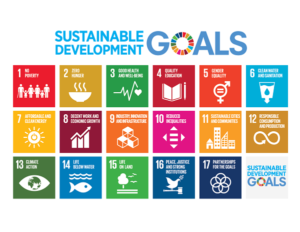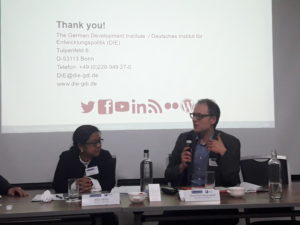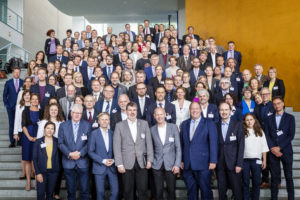
For DIE and the Secretariat of SDSN Germany Adolf Kloke-Lesch, Silke Weinlich and Janina Sturm participated in this year’s High Level Political Forum (HLPF) in New York as members of the German delegation. The purpose of the forum, which took place on 9-18 July this year, is to annually review the implementation of the 2030 Agenda for Sustainable Development.
This year, also first results of the Global Sustainable Development Report (GSDR) were presented, in the preparation of which the DIE was involved. The GSDR formulates recommendations from the perspective of science and will be presented in its entirety for the first time in September 2019 to the heads of state and government of the UN Member States.
At the margins of the High Level Political Forum, many side events took place. SDSN Germany organized a disucssion on spillover effects in the implementation of the SDGs together with GIZ organized. DIE hosted a side event that presented the results of a study on earmarked funding in the multilateral development system (in preparation). International organisations such as the United Nations Development Programme (UNDP), the World Health Organisation (WHO) or the United Nations Population Fund (UNFPA) possess multilateral assets, which assign them unique roles in implementing the 2030 Agenda. The current way of the funding the UN development system however makes this more difficult: A majority of earmarked contributions come with geographic or thematic specifications and lead to fragmentation, supply-orientation, competition, and underfunding of multilateral core activities. In spite of some more helpful varieties that foster cooperation and innovation, the majority of earmarked funding in the UN development system runs counter to the demands of the 2030 Agenda for transformative, integrated, and comprehensive approaches. At the New York Office of the Dag Hammarskjöld Foundation, about 20 representatives of international organisations and member states discussed how ongoing reform processes could bring about progress.
In addition to this year’s HLPF, there was also the first Senior Level Meeting (SLM) of the Global Partnership for Development Effectiveness (GPDE), involving government representatives from developing, newly industrialising and industrialised countries, as well as civil society and other non-governmental organisations stakeholders, including DIE. They met for the first time at the United Nations Headquarter. Partners of DIE’s Managing Global Governance (MGG) network participated in discussions on effectiveness in South-South cooperation.


